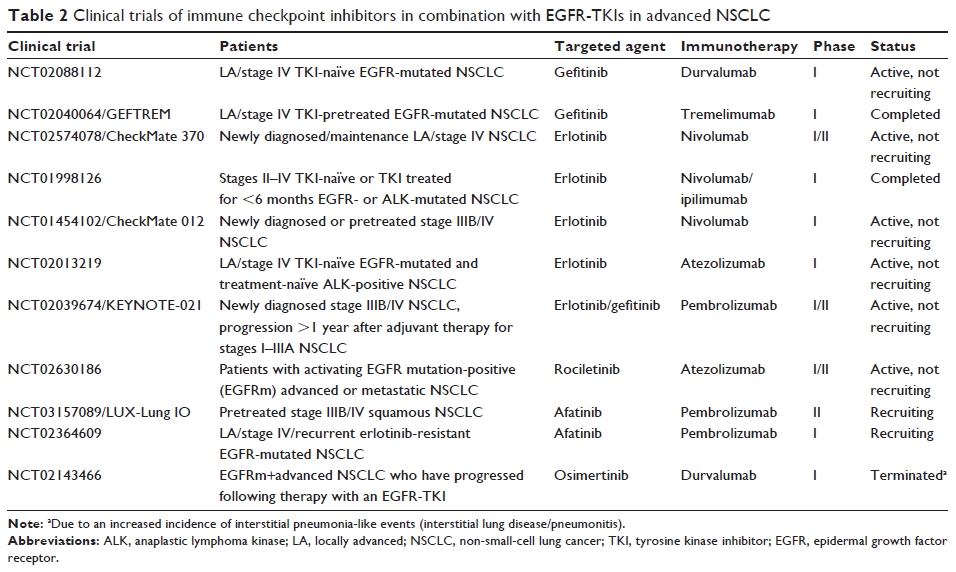108605
论文已发表
注册即可获取德孚的最新动态
IF 收录期刊
- 3.4 Breast Cancer (Dove Med Press)
- 3.2 Clin Epidemiol
- 2.6 Cancer Manag Res
- 2.9 Infect Drug Resist
- 3.7 Clin Interv Aging
- 5.1 Drug Des Dev Ther
- 3.1 Int J Chronic Obstr
- 6.6 Int J Nanomed
- 2.6 Int J Women's Health
- 2.9 Neuropsych Dis Treat
- 2.8 OncoTargets Ther
- 2.0 Patient Prefer Adher
- 2.2 Ther Clin Risk Manag
- 2.5 J Pain Res
- 3.0 Diabet Metab Synd Ob
- 3.2 Psychol Res Behav Ma
- 3.4 Nat Sci Sleep
- 1.8 Pharmgenomics Pers Med
- 2.0 Risk Manag Healthc Policy
- 4.1 J Inflamm Res
- 2.0 Int J Gen Med
- 3.4 J Hepatocell Carcinoma
- 3.0 J Asthma Allergy
- 2.2 Clin Cosmet Investig Dermatol
- 2.4 J Multidiscip Healthc

免疫疗法结合表皮生长因子受体-酪氨酸激酶抑制剂用于治疗非小细胞肺癌
Authors Liang H, Liu X, Wang M
Received 27 June 2018
Accepted for publication 7 August 2018
Published 25 September 2018 Volume 2018:11 Pages 6189—6196
DOI https://doi.org/10.2147/OTT.S178497
Checked for plagiarism Yes
Review by Single-blind
Peer reviewers approved by Dr Cristina Weinberg
Peer reviewer comments 2
Editor who approved publication: Dr Tohru Yamada
Abstract: In recent years, targeted therapy and immunotherapy have played important roles in the treatment of patients with non-small-cell lung cancer (NSCLC). Drugs that target epidermal growth factor receptor (EGFR) mutations (eg, gefitinib, erlotinib, icotinib, and osimertinib) are among the most commonly used targeted therapies. Afatinib is an irreversible second-generation EGFR-tyrosine kinase inhibitor (EGFR-TKI), and the LUX-Lung 3 trial demonstrated the superiority of afatinib to cisplatin and pemetrexed in the frontline treatment of treatment-naïve patients with advanced EGFR mutation adenocarcinoma of the lung. Although these drugs show significant therapeutic efficacy, most patients invariably experience disease progression resulting in death. Immunotherapy targeting programmed death-1 (PD-1)/programmed death-ligand 1 (PD-L1) has now been approved for the first-line treatment of patients with advanced NSCLC. These can produce sustained clinical responses by reversing negative regulators of T-cell function; however, immunotherapy response rates remain low, and only a few patients ultimately benefit from this approach. Here, we discuss the potential of EGFR-TKIs for inducing antitumor immunity and the feasibility of their combination with immunotherapy (including PD-1/PD-L1 inhibitors) in NSCLC patients and the associated challenges for clinical application.
Keywords: non-small cell lung cancer, epidermal growth factor receptor-tyrosine kinase inhibitors, immunotherapy
